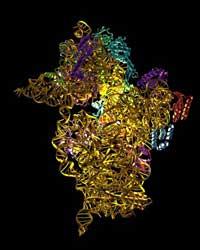Progress in the study of protein folding
Folding is one of the most important steps in the process of protein synthesis, since the protein goes from being a linear chain of amino acids to being a three-dimensional structure. The appropriate folding is necessary to transform the molecule into functional. The accumulation of poorly folded proteins in the cell causes degenerative diseases of the nervous system such as Alzheimer's, Parkinson's, or mad cow disease.

The chemical team at the University of Pennsylvania, led by Feng Gai, has managed to directly follow the process of protein folding. The observation of the process is not easy, as it occurs very quickly in the range of nanoseconds. Therefore, simple proteins have been selected that are folded in a known structure, in the form of a helix, and some amino acids have been marked by protein with 13 carbon. Once submerged in the water, they have been heated and laser distoled. Using infrared spectroscopy, the folding process is observed and they realize that proteins need different times to return to the initial structure. In other words, to achieve a three-dimensional structure, the folding can be done by different ways. Gai has pointed out that this discovery can be a major step forward in the treatment of degenerative diseases in the nervous system. Obtaining a destolation of faulty proteins accumulated in cells would allow their correct folded by another medium and the refunctionality of the protein.
In any case, only with small and simple proteins, it has been achieved for the moment its refolding. It is not so clear whether the process will work equally on more complex and important proteins.
Buletina
Bidali zure helbide elektronikoa eta jaso asteroko buletina zure sarrera-ontzian











